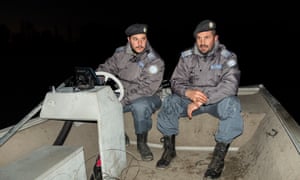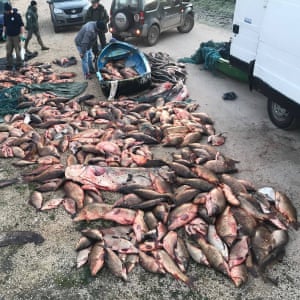ITALY
Pirate hunters of the Po: how locals sick of poachers decided to fight back
As night falls in Italy’s largest delta, volunteers board tiny boats to track down the elusive fish mafia plundering the waters
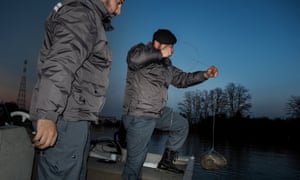
During the day Denny Covezzi works in a fishing equipment shop and Andrea Mocchi at at a factory. But at sunset they don heavy grey uniforms and set out on their small boat to patrol the river.
They’re looking for anything suspicious: nets, traps, perhaps a van parked by the bank. They hear a rumble in the bushes, and Covezzi moves the boat closer to check: nothing. “It must have been an animal,” he says. Later, they notice something in the river – small homemade traps made of wire and plastic bottles. They haul the traps into the boat and break them apart.
The pirate hunters, as they are known in the local media, are looking for poachers on the delta of the Po River in Italy. Emptying into the Adriatic Sea, the brackish Po has one of Europe’s largest deltas, but until recently it has been plagued by poachers.
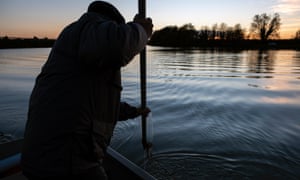
That’s starting to change. In the past three years, the efforts of volunteers such as Covezzi and Mocchi to cut nets and help identify criminals have prompted a series of investigations into poachers by Italy’s Carabinieri and Forest Service, and the authorities in Romania, Spain, France and the UK. The result has been a reduction in poacher numbers by about a third since the height of their activity between 2013 and 2016.
The success is particularly impressive given how profitable an activity poaching had become here. Illegal fishing has a long history in the area, but until the 1960s it was largely done by poor families who lived off eels. In recent years, however, organised criminal groups ramped it up to an industrial level, using intimidation and a network of lookouts. “They can fish as much as 20,000kg (20 tonnes) in a single night,” says the coordinator of the volunteer group, Alessandro Pagliarin.
Police have struggled to monitor the delta, which covers 1,400 sq km, leaving the poachers free to roam. At its peak, the poaching was worth as much as €5m (£4.6m) a year, with about 200 people involved. “Can you imagine a regular firm having so much profit with such low investment?” says Stefano Testa, of the Carabinieri’s anti-poaching unit.
Although Italians consume relatively little freshwater fish, the poachers sell the carp, catfish and sheatfish (which can reach more than two metres in length) to eastern Europe, where demand is high. Testa says the gangs are organised in a pyramid structure, with area managers overseeing labourers, and “intermediaries between area managers that fish in Italy and distributors in eastern Europe”. According to Testa, many of the poachers hail from the Danube delta in Romania, where they used to fish illegally until Romanian authorities cracked down in the early 2010s. “The Po delta is similar to the Danube delta, so they can use the same techniques,” says Testa.
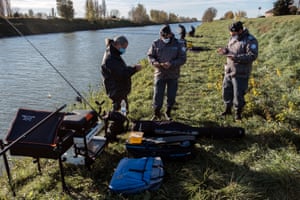
Those techniques include using electro-stunners made from car batteries or dumping chemicals into the water, before using trawling nets to collect the fish, with devastating effect on the ecosystem. There are also concerns for those who eat the fish. “The fish from the Po River can be highly polluted, it’s not supposed to be eaten,” says Michele Valeriani of Gruppo Siluro, an association of local recreational fishermen raising awareness on environmental issues.
It was recreational fishermen who were the first to notice, about a decade ago, that something shady was going on in the area. “All of a sudden we were finding dozens of dead fish along the canal locks,” Valeriani says. “It’s unlikely that 50 fish naturally die at the same moment.” They suspected poaching, and soon the patrols were formed.
There were early successes. “At the beginning, poachers were active also during the day, because there were no controls,” says Covezzi. “But now we forced them to act at night.” The volunteers have also confiscated nets and set thousands of fish free.
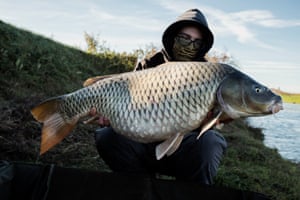
Back on the boat with Covezzi and Mocchi, they come across a tent and ask the fisherman to show them his licence. He’s no poacher: it’s not uncommon for recreational fishermen to spend the night on the delta’s shore, and the law requires them to set their catch free.
Mocchi, who is married with children, says the nightly patrols are taking a toll on his family life. Covezzi, on the other hand, says his girlfriend is encouraging him. “She often insists on coming along.”
They are pleased that organised crime on the delta seems to be on the retreat, but it’s too early to celebrate. “Recent history taught us that these groups retreat when they feel under scrutiny, only to re-emerge when we lower our guard,” says Pagliarin. “Our job is to keep patrolling. We are the eyes on the delta.”

